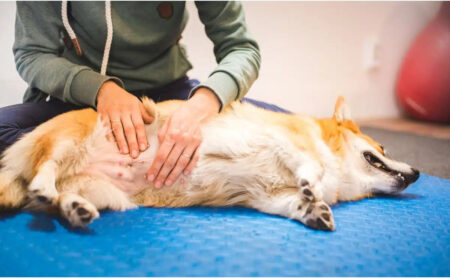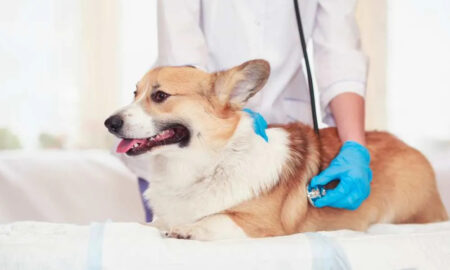Bloat, or Gastric Dilatation-Volvulus (GDV), is a serious and potentially life-threatening condition that commonly affects dogs. It occurs when a dog’s stomach fills with gas, food, or fluids and then twists, cutting off blood supply to the stomach and other organs. This condition can be caused by various factors, such as eating too quickly, eating one large meal a day, or exercising vigorously after eating. One of the common questions people have about dogs with bloat is whether they will sleep during this condition.
In this article, we will delve into the topic of bloat in dogs and explore whether a dog with bloat will sleep or not. We will discuss the signs and symptoms of bloat, its causes, and risk factors, and the treatment options available. Additionally, we will also provide tips for preventing bloat in dogs and offer further insights into this concerning topic.
Will A Dog With Bloat Sleep?
Yes, a dog with bloat may appear lethargic and may sleep more than usual. This can be a symptom of the condition, as the dog’s body is trying to conserve energy and cope with the discomfort and pain. However, it is important to note that bloat is a serious emergency requiring immediate veterinary attention, so any changes in behavior or activity level should be monitored closely and addressed promptly.
What Is Bloat?
Bloat is a condition in which the stomach becomes enlarged and distended due to an excessive accumulation of gas or fluid. It is also known as gastric dilatation-volvulus (GDV) or gastric torsion. While bloat can occur in humans, it is especially common in certain dog breeds, such as large and deep-chested dogs like Great Danes, Dobermans, and St. Bernards.
Bloat can be a very serious and potentially life-threatening condition if left untreated. As the stomach expands, it can compress nearby organs, leading to a decrease in blood flow and oxygen supply. This can result in tissue damage and even death if not addressed promptly.
SEE ALSO: PetSmart Playup: Keep Your Pet Entertained
Will A Dog With Bloat Drink Water?
It is not recommended for a dog with bloat to drink water. Bloat is a life-threatening condition in which the stomach becomes distended due to gas and can lead to the stomach twisting, cutting off blood flow to vital organs. Drinking water can exacerbate the condition by adding more fluid to the stomach. It is important to seek immediate veterinary care if you suspect your dog has bloat.
Will A Dog With Bloat Eat?
A dog with bloat can eat, but it is not recommended. Bloat is a serious and potentially life-threatening condition in dogs where their stomach becomes distended and twisted, cutting off blood flow to vital organs. Eating or drinking can worsen the condition, so it is important to seek immediate veterinary attention if you suspect your dog has bloat.
Will A Dog With Bloat Pee?
Yes, a dog with bloat may still be able to urinate, although it may be difficult for them to do so due to the discomfort and bloating in their abdomen. Bloat, also known as gastric dilatation-volvulus (GDV), is a serious condition that occurs when a dog’s stomach becomes distended and twists upon itself, cutting off blood flow and potentially leading to organ damage and death. If your dog is exhibiting symptoms of bloat, such as a distended abdomen, retching or trying to vomit without producing anything, restlessness, or difficulty breathing, it is important to seek immediate medical attention from a veterinarian.
Causes of Bloat in Dogs
- Swallowing Air: When dogs gulp their food or water too quickly, they may swallow a lot of air along with it. This air can become trapped in the stomach, causing it to become distended and filled with gas.
- Exercise After Eating: Dogs that exercise right after eating may be at risk for bloat. This is because physical activity can cause the stomach to twist, trapping gas and food in the stomach.
- Eating Large Meals: Large, infrequent meals can also cause bloat in dogs. When a dog eats a large amount of food, their stomach may become distended and filled with gas, leading to bloat.
- Eating From a Raised Bowl: There is some debate about whether or not eating from a raised bowl can contribute to bloat in dogs. Some studies have shown that eating from a raised bowl may increase the risk of bloat, while others have not found a significant correlation.
- Genetics: Certain breeds of dogs are more prone to bloat than others. Deep-chested breeds, such as Great Danes, German Shepherds, and Saint Bernards, have a higher risk of developing bloat.
- Stress: Stress and anxiety can also contribute to bloat in dogs. When a dog is in a high-stress situation, their digestive system may become disrupted, leading to overproduction of gas in the stomach.
- Underlying Health Conditions: Certain health conditions, such as gastroparesis (a condition that slows stomach emptying) and gastroesophageal reflux disease (GERD), can also increase a dog’s risk of developing bloat.
- Age: Bloat is more common in older dogs, as their digestive systems may not function as efficiently as they once did.
- Gender: Male dogs are at a higher risk of developing bloat than female dogs.
- Previous Occurrences: If a dog has previously experienced bloat, they are at a higher risk of developing it again in the future. Dog owners need to monitor their pets for any signs of bloat and seek veterinary care immediately if they suspect their dog may be experiencing it again.
What Are The Signs Of Bloat?
- Swollen or Distended Abdomen: The most obvious sign of bloat is a visibly bloated or enlarged stomach that may appear distended.
- Excessive Drooling: Dogs experiencing bloat may drool excessively and have thick saliva or foam around their mouth.
- Unsuccessful Attempts to Vomit: Dogs may try to vomit, but nothing comes out. This is due to an obstruction in the stomach.
- Restlessness and Discomfort: Bloat can cause dogs to become restless, pace, and appear uncomfortable. They may also whine, groan, or pant excessively.
- Dry Heaving: In some cases, dogs may continuously dry heave or retch as a result of bloating.
- Difficulty Breathing: With a swollen stomach pressing against the diaphragm, dogs may have trouble breathing and exhibit signs of distress, such as rapid and shallow breathing.
- Pale Gums: A telltale sign of bloat is pale gums, indicating poor circulation and lack of oxygen.
- Rapid Heart Rate: Dogs with bloat may have a rapid heart rate due to the body trying to compensate for the lack of oxygen.
- Weakness or Collapse: In severe cases, dogs may become weak, unable to stand, and may even collapse.
How Do Dogs Act When They Have Bloat?
When a dog has bloat, also known as gastric dilatation and volvulus (GDV), they may show several different signs and symptoms. One of the most common signs is restlessness and pacing. Dogs with GDV may also drool excessively, seem very uncomfortable, and try to vomit but not be able to bring anything up. Other signs include abdominal pain, swelling in the abdomen, and a distended stomach.
Dog Bloat Timeline
The timeline of bloat can vary depending on the severity and the individual dog’s response to treatment. However, in general, the timeline can be broken down into three stages: early, advanced, and critical.
Early Stage: The early stage typically lasts 1-2 hours after the onset of symptoms. During this stage, the dog may start to show signs of discomfort, such as pacing, restlessness, and excessive salivation. The abdomen may also appear slightly distended. If treated promptly during this stage, the chances of survival increase.
Advanced Stage: The advanced stage can last around 2-6 hours after symptoms appear. In this stage, the dog’s condition has worsened, and their abdomen may become severely distended. They may appear lethargic and weak due to low blood pressure. This is when the dog’s vital organs are being compromised, and immediate veterinary attention is crucial.
Critical Stage: The critical stage is when the bloat has progressed to a life-threatening condition. This stage can occur within 6-12 hours after the onset of symptoms. The dog’s vital organs, including the heart, lungs, and spleen, may be affected, and time is of the essence to save the dog’s life. Surgery is often required to untwist the stomach, relieve pressure, and remove any damaged tissue.
What Should You Do If Your Dog Has Bloat?
If you think your dog has bloat, the first thing you should do is call your veterinarian. Bloat is a serious medical condition that can be life-threatening, so it’s important to seek help from a professional as soon as possible. Your veterinarian will likely want to examine your dog and run some tests to confirm the diagnosis. Once your dog has been diagnosed with bloat, treatment will likely involve surgery to relieve the pressure on the stomach and remove any gas or fluid that has built up. After surgery, your dog will need to be monitored closely for several days to make sure they are recovering properly.
What Relieves Bloating Fast In Dogs?
There are a few things you can do to help relieve bloating in dogs quickly. First, you should try to get your dog to walk around. This will help the gas move through the digestive system and relieve pressure. You can also try giving your dog small, frequent meals instead of large meals, which can cause bloating. If your dog is willing to eat, you can also give them a bland diet like boiled chicken and rice. In addition, you can try giving your dog some over-the-counter gas relief medication like simethicone.
How Can You Prevent Bloat?
- Feed Multiple Small Meals: Instead of giving your dog one large meal that they eat quickly, divide their daily food intake into multiple smaller meals. This will prevent them from gulping down large amounts of food at once.
- Use Slow-Feeder Bowls: Slow-feeder bowls have raised sections or obstacles that make it difficult for dogs to eat their food quickly. This forces them to slow down and take smaller bites, reducing the amount of air they swallow.
- Avoid Exercise After Mealtime: It is recommended to wait at least one hour after your dog has eaten before engaging in vigorous activities or exercise. This allows enough time for their food to settle and reduces the risk of bloat.
- Limit Water Intake: Drinking too much water too quickly can contribute to bloat. It is important to monitor your dog’s water intake and provide small amounts at a time, especially after meals.
- Avoid Eating Too Quickly: Some dogs may eat too quickly due to competition or anxiety. It is important to discourage this behavior and train them to eat at a slower pace.
- Do Not Use Raised Food Bowls: While there is some debate on whether raised food bowls contribute to bloat, recent studies have shown that they may increase the risk. Stick to using regular food bowls at ground level.
- Be Mindful of Food Choices: Certain dry foods, especially those high in grain or fat content, have been linked to bloat. Consult with your veterinarian for recommendations on the best diet for your dog.
- Know Your Dog’s Risk: Large, deep-chested breeds and older dogs are more susceptible to bloat. Be aware of your dog’s risk factors and take necessary precautions.
- Consider a Gastropexy: In some cases, your veterinarian may recommend a procedure called a gastropexy in which the stomach is surgically tacked to the abdominal wall. This can reduce the risk of gastric dilatation and volvulus (GDV), the medical term for bloat.
- Be Aware of Symptoms: Familiarize yourself with the signs and symptoms of bloat, such as a distended abdomen, restlessness, and attempts to vomit without producing anything. If you notice any of these signs, seek veterinary attention immediately.
SEE ALSO: Do Dogs Heal Faster Than Humans?
FAQs
Q. How long will a dog with bloat sleep?
A. A dog with bloat may sleep for several hours or even days. Bloat is a very serious condition that can cause the stomach to twist, leading to a life-threatening emergency. In some cases, bloat can be resolved with surgery, but in others, the dog may not survive.
Q. Will a dog with bloat still want to play?
A. It’s unlikely that a dog with bloat will feel like playing. Bloat is a very uncomfortable and potentially life-threatening condition, so a dog experiencing it is likely to be in pain and feeling very unwell.
Q. Will a dog with bloat pass gas?
A. A dog with bloat may or may not pass gas. Bloat, also known as gastric dilatation-volvulus (GDV), is a serious condition that can cause the stomach to expand with air and then twist.
Conclusion
In conclusion, a dog with bloat may or may not sleep depending on the severity of their condition. In mild cases of bloat, a dog may still be able to sleep but may be restless and uncomfortable. In more severe cases, a dog may be in too much pain and discomfort to sleep and may even exhibit signs of distress. It is important to closely monitor a dog with bloat and seek immediate veterinary care if any concerning symptoms arise, including difficulty sleeping or excessive lethargy. Prompt treatment is crucial in managing bloat and preventing potential complications.


